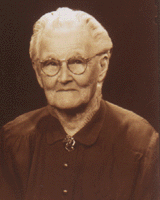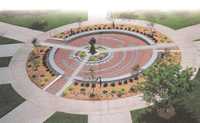
Bertha E. Henderson
is honored with a Medium Paver from Mary Lee Scott Esty.
 Bertha Eudora Henderson, 1870-1964, was born in Volney, Iowa and died in Belleville, Kansas. She was my grandmother and her gentleness and quiet courage remain an inspiration to me. Self-supporting at 16, she persevered in graduating with a teaching certificate in Iowa. In 1903, with her husband, Alva, and five small children, she traveled from Iowa to Monte Vista, Colorado, in an attempt to recover from TB. Her stories of the trip, the hardship of such travel, including avoiding drunken cowboys on cattle drives in Dodge City, made those early Kansas days come alive.
Bertha Eudora Henderson, 1870-1964, was born in Volney, Iowa and died in Belleville, Kansas. She was my grandmother and her gentleness and quiet courage remain an inspiration to me. Self-supporting at 16, she persevered in graduating with a teaching certificate in Iowa. In 1903, with her husband, Alva, and five small children, she traveled from Iowa to Monte Vista, Colorado, in an attempt to recover from TB. Her stories of the trip, the hardship of such travel, including avoiding drunken cowboys on cattle drives in Dodge City, made those early Kansas days come alive.
After recovering her health, her heart was broken by the death of her eldest son of rheumatic fever. On the return trip to Iowa, again in a covered wagon, they stopped near Munden, Kansas, began farming, and made that their new home. Among her experiences that made a big impression on me were the dangers of encountering rattlesnakes between the house and outhouse, and the way she tried to keep occasional hordes of grasshoppers out of the house. They would descend in huge clouds upon the fields and house, and she splashed cans of milk over the windows so they would get stuck and not be able to enter through cracks around the windows. After being widowed in 1922, she eventually moved to Wichita to help her daughters during the Depression (Hope Henderson Kelly Scott and Burdine Rashleigh).
She was active in the Fairmount Community Church and faithfully attended musical events at WU. Her proud bearing and inner strength are typical qualities of those heroines who helped build our community.
July 16, 1998
She was a survivor of the world-wide flu epidemic of 1917-1918. After she recovered from the infection, she and her mother-in-law, Ida Kelly, helped the doctor nurse those who were ill. Every pregnant woman in the area died, and she played piano for every funeral during that period.
Hope was widowed the first of three times during the early days of the Depression when she had three small children. She raised her family in Wichita with her mother's help while she attended business college full-time during the day, baby-sitting for other families at night. After graduation she got a job at the Oliver farm implement company where she worked until marrying Anson Scott in 1937. They had one child, Mary Lee Scott Esty, (WU, 1960). Anson died in 1947. In 1948, Hope began secretarial work at the Kansas State YWCA, eventually becoming office manager and retiring about 1970. On her 63rd birthday she married William Mulch and they enjoyed traveling, and activities at Fairmount Community Church. At age 84, she was widowed for the third time. To avoid the Kansas winters she moved to California, near two children.
Wichita University was an important presence in her life; night classes, concerts and games were a regular part of her life, and we lived next door to Ralph Miller, the WU basketball coach. A more pervasive Wichita University presence was the evolution of our home into a home for foreign students attending WU. At one time we had students from Egypt, China, Italy and Germany. The political discussions were often heated, always interesting. This period of being their home-away-from-home began in 1953, continuing until 1972. Some of these students maintained contact with her for years, one even visiting her in California until the year before she died.
She touched many lives and hearts deeply. WU was dear to her heart and her contribution to every community was typical of her, a quiet, loving, unassuming heroine.
Submitted by Mary Lee Scott Esty, Ph.D.
July 17, 1998










